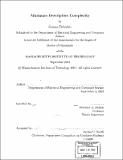Minimum description complexity
Author(s)
Beheshti, Soosan, 1969-
DownloadFull printable version (5.971Mb)
Other Contributors
Massachusetts Institute of Technology. Dept. of Electrical Engineering and Computer Science.
Advisor
Munther A. Dahleh.
Terms of use
Metadata
Show full item recordAbstract
The classical problem of model selection among parametric model sets is considered. The goal is to choose a model set which best represents observed data. The critical task is the choice of a criterion for model set comparison. Pioneer information theoretic based approaches to this problem are Akaike information criterion (AIC) and different forms of minimum description length (MDL). The prior assumption in these methods is that the unknown true model is a member of all the competing sets. We introduce a new method of model selection: minimum description complexity (MDC). The approach is motivated by the Kullback-Leibler information distance. The method suggests choosing the model set for which the model set relative entropy is minimum. We provide a probabilistic method of MDC estimation for a class of parametric model sets. In this calculation the key factor is our prior assumption: unlike the existing methods, no assumption of the true model being a member of the competing model sets is needed. The main strength of the MDC calculation is in its method of extracting information from the observed data. (cont.) Interesting results exhibit the advantages of MDC over MDL and AIC both theoretically and practically. It is illustrated that, under particular conditions, AIC is a special case of MDC. Application of MDC in system identification and signal denoising is investigated. The proposed method answers the challenging question of quality evaluation in identification of stable LTI systems under a fair prior assumption on the unmodeled dynamics. MDC also provides a new solution to a class of denoising problems. We elaborate the theoretical superiority of MDC over the existing thresholding denoising methods.
Description
Thesis (Ph. D.)--Massachusetts Institute of Technology, Dept. of Electrical Engineering and Computer Science, 2002. Includes bibliographical references (p. 136-140).
Date issued
2002Department
Massachusetts Institute of Technology. Department of Electrical Engineering and Computer SciencePublisher
Massachusetts Institute of Technology
Keywords
Electrical Engineering and Computer Science.